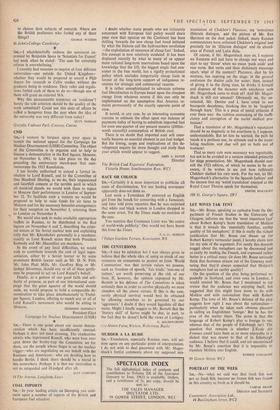LET WIVES TAK TENT
Boase, speaking ex cathedra from the De- partment of French Studies in the University of Glasgow, informs me that the 'most important fact' about Robert Kemp's Scots translation of Moliere is that it reveals the 'essentially familiar, earthy quality of his metaphors.' If this is really the richest justification that Mr. Boase can dream up for Robert Kemp's vernacular jaunt, I hereby claim him for my side of the argument. For surely this donnish nugget about the metaphors can be discovered just as easily by reading the French, and expressed rather better in a critical essay. Or does Mr. Boase seriously think that Scotsmen stream out of the Gateway mut- tering that they'd always suspected that Moliere's metaphors had an earthy quality?
On the question of the play being performed re- peatedly in Scotland, and even once in London, I would remind Mr. Boase that I mentioned in my review that the audience was enjoying itself, but suggested that this might have more to do with Moliere and with nationalism than with Robert Kemp. The tone of Mr. Boase's defence of the play suggests how right I was about the nationalism— particularly when he takes such obvious pleasure in calling an Englishman 'foreign.' But he has the crux of the matter there. The point is that the language of Robert Kemp's play is foreign to me, whereas that of the people of Edinburgh isn't. The question that remains is whether L'Ecole des Femmes could have been as or more enjoyable in a dialect that was nearer to that of its Edinburgh audience. I believe that it cotild, and am unconvinced by Mr. Boase's assertion that it is impossible to translate Moliere into English.
99 Gower Street. WC1
BAMFIER GASCOIGNE






































 Previous page
Previous page